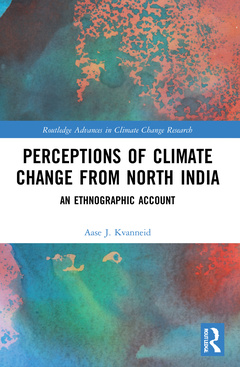Description
Perceptions of Climate Change from North India
An Ethnographic Account
Routledge Advances in Climate Change Research Series
Author: Kvanneid Aase J.
Language: English
Subjects for Perceptions of Climate Change from North India:
Keywords
Shivalik Hills; Eco Sensitive Zone; ecological crisis; Climate Change; North Indian hill agriculture; Watershed Management Project; political-economic transformation; Good Life; environmental issues; Rajput Caste; UN; Young Man; Midday; Face To Face; Dry Heat; Climate Change Adaptions; Married Women; Contemporary Society; Waterfall; Taro Plant; Sunny; Rajput Women; Tamil Nadu; Clean India Mission; BPL; Horse Gram; Guru Ravidas; Meratus Dayak
Publication date: 09-2022
Support: Print on demand
Publication date: 03-2021
· 15.6x23.4 cm · Hardback
Description
/li>Contents
/li>Readership
/li>Biography
/li>
Perceptions of Climate Change from North India: An Ethnographic Accountexplores local perceptions of climate change through ethnographic encounters with the men and women who live at the front line of climate change in the lower Himalayas.
From data collected over the course of a year in a small village in an eco-sensitive zone in North India, this book presents an ethnographic account of local responses to climate change, resource management and indigenous environmental knowledge. Aase Kvanneid?s observations cast light on the precarious reality of climate change in this region and bring to the fore issues such as access to water, NGO intervention and climate information for farmers. In doing so, she also explores classic topics in the study of rural India including ritual, gender, social hierarchy and political economy. Overall, this book shows how the cause and effect of climate change is perceived by those who have the most to lose and explores how the impact of climate change is being dealt with on a local and global scale.
This book will be of great interest to students and scholars of the anthropology of climate change, environmental sociology and rural development.
Prologue
Introduction
Climate Change in India
A Scientifically Social Climate Change
Writing Climate Change
A Note on Methodology
A Choice of Words and How They Flow
References
Endnotes
Chapter 1: Climate Change Expressions
Social Principles of Differentiation in Rani Mājri
Class in Rani Mājri
Caste in Rani Mājri
Gender in Rani Mājri
References
Endnotes
Chapter 2: Waterworn
Becoming Rani Mājri: A Kuhl Story
Time Beyond Living Memory
Time Remembered
Contemporary Rani Mājri
Water-rights
Unirrigated Development
References
Endnotes
Chapter 3: Governing Awareness
On Global-Local Gaps and Frictions
Junctions
Junction 1: Governing Bodies
Junction 2: Governing Forest
Junction 3: Governing Soil and Water
Development Trajectories
A History of Management
Disconnected Development
References
Endnotes
Chapter 4: Divine Jurisdictions
Deciduous Land Management
Settled Deities
Placeless Beings
Auspicious Placemaking
Negotiating Village Territories
References
Endnotes
Chapter 5 Climate Identities
Being Climate Change Aware
Life in the "Greenery"
Deprived of Science, Bestowed with Eco-Sensitivity?
Climate Change as a Discourse
References
Endnotes
Chapter 6: A Dance of Global Warming
Environmental Retribution for the ‘Wrong’ Progress
On Reductionism and Disempowerment
Concluding Remarks
References
Endnotes
Aase J. Kvanneid is an anthropologist currently working as an associate professor of Global Development Studies at the University of Agder and as a postdoctoral researcher at the Department of Cultural Studies at the University of Oslo. Her main areas of research are the societal aspects of environmental and climate change, and she is currently researching the empirical embeddedness of sustainability and transcendental visions in Asia.
These books may interest you

Local Climate Change and Society 172.36 €



